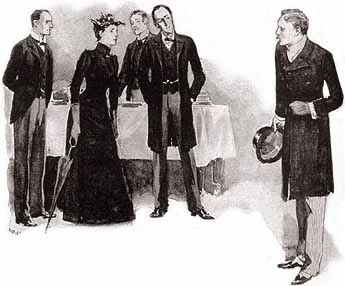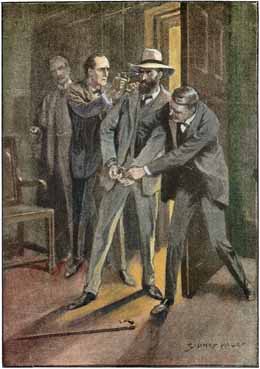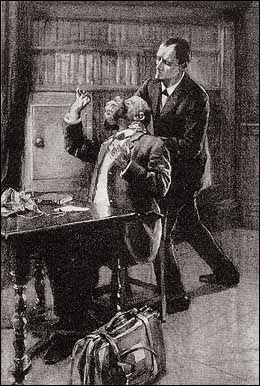Sherlock Holmes found Americans really fascinating. Upon greeting Mr. Francis Moulton in “The Noble Bachelor,” Holmes proceeds to treat the young man like some sort of fantastic oddity – like he has just encountered a white tiger or a new species of honeybee in his sitting room. It’s as if Holmes wants to analyze Moulton, to extract the young American’s secrets through scientific inquiry and research, to study him intensely under a high-powered microscope. Indeed, it is not so difficult to imagine Holmes turning to Watson and saying, “Oh, please let me keep him! I need more information for my index and he’ll make just the perfect addition. I promise to feed him, water him, and walk him every day!”
 |
| Fine, Lord St. Simon. You can leave. I don't want to share my new American friends anyway. |
Not all Americans in the Canon are depicted in such glowing terms, of course. While “The Dancing Men” features the young American woman Elsie Cubitt (née Patrick) whose devotion to her husband causes her to attempt to take her own life after his murder, it also features the villainous Abe Slane – “the most dangerous crook in Chicago.” It is Slane who murders Hilton Cubitt, but only after he torments poor Elsie with a series of haunting coded messages, culminating in the rather nightmarish missive: “ELSIE - RE – ARE TO MEET THY GO-.” And while Slane contends that “…there was never a man in this world loved a woman more than I loved [Elsie],” needless to say, Slane’s monstrous behavior more than eclipses any love that he can profess to feel.
 |
| I told you I wanted to know more about Chicago. I wasn't kidding. |
Chronologically speaking, Sherlock Holmes’s American experiences culminate with “His Last Bow.” The story finds Holmes having just spent two years undercover as an Irish-American named “Altamont.” However, if the Sidney Paget’s illustration is to be believed, the extent of his disguise involved growing an unsightly goatee and adopting an American accent. Anyway, Holmes’s American journey took him on a rather circuitous route, as he says he has been from Chicago to Buffalo, and those are just the places he mentions. But the reader is left behind on this journey, and does not get to experience America with Sherlock Holmes. And, it would seem, his excursion has left him weary of America, if not Americans. As he says to Watson, "Tomorrow [the goatee] will be but a dreadful memory. With my hair cut and a few other superficial changes I shall no doubt reappear at Claridge's tomorrow as I was before this American stunt - I beg your pardon, Watson; my well of English seems to be permanently defiled - before this American job came my way” (LAST).
 |
| Well, that is some very American facial hair indeed. I can see why Von Bork was fooled. I think. |
oOo
“Better Holmes & Gardens” now has its own Facebook page. Join by “Liking” the page here, and receive all the latest updates, news, and Sherlockian tidbits.
